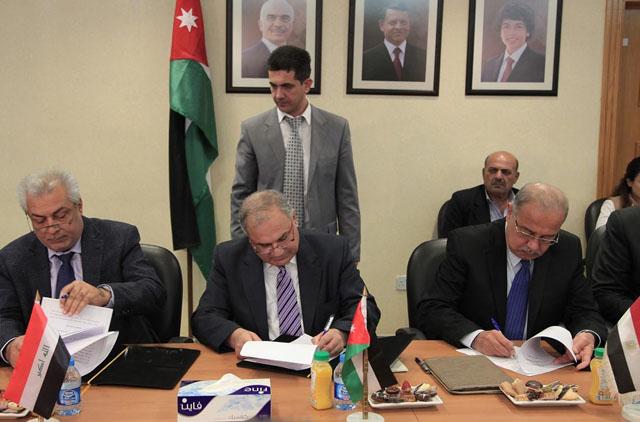You are here
Jordan signs deal with Egypt, Iraq over regional energy venture
By Mohammad Ghazal - Mar 06,2014 - Last updated at Mar 06,2014

AMMAN — Jordan, Iraq and Egypt started on Thursday studying projects to transfer natural gas from Iraq to the Kingdom and Egypt, according to energy ministers of the three countries.
With regard to this, the three countries have started looking into extending an oil pipeline from Iraq’s Basra to Egypt via Jordan’s Aqaba to export Iraqi oil to Africa, they said during a ceremony to sign a memorandum of understanding.
“We are looking into linking the natural gas fields in Iraq that are being developed to the Arab Gas Pipeline in Jordan. Then, we can provide the commodity to Jordan, Egypt and many other countries that are connected through the existing pipeline,” Iraq’s Oil Minister Abdul Kareem Luaibi told The Jordan Times on Thursday on the sidelines of the ceremony.
The Arab Gas Pipeline stretches from Egypt to Lebanon through Jordan and Syria.
Under the memo, the three countries will examine extending the $18 billion Iraqi oil pipeline, which will transfer one million barrels of crude oil per day from Basra to Aqaba, to reach Egypt, Egypt’s oil minister, Sherif Ismail, said during a press conference after he signed the memo with his peers.
“Egypt is ready to refine the Iraqi oil at its refineries to facilitate its exports to Sudan and many other African countries,” said Ismail on Thursday.
The Basra-Aqaba oil pipeline is expected to be operational late 2017, Minister of Energy and Mineral Resources Mohammad Hamed said on Thursday, noting that the pipeline will provide Jordan with 150,000 barrels of oil per day.
“The projects we are discussing with Iraq and Egypt are mega-projects that will be a turning point in the Jordanian energy sector,” the energy minister continued.
Stressing the importance of the planned projects, Luaibi said: “Iraq’s production of oil and gas is expected to rise sharply during the few coming years and we need gateways for exports. The pipeline through Aqaba will be a main instrument in this regard and will help us boost our exports. In addition, it will greatly benefit the Jordanian economy.”
Also on Thursday, the Ministry of Energy and Mineral Resources and the National Electric Power Company signed two agreements with the Jordanian-Egyptian FAJR Company to build an 800-metre pipeline that connects the already under construction liquefied natural gas terminal in Aqaba Port to the FAJR’s Arab Gas Pipeline.
Under the agreements, the pipeline will be used for transferring gas from the terminal in Aqaba to power generation plants in Jordan that exist along the pipeline, which stretches from El Arish in Egypt to the north of Jordan and continues through Syria until Lebanon, said Hamed.
Gas is expected to be supplied to power generation plants through the Arab Gas Pipeline as of early 2015, according to the ministry.
On natural gas imports from Egypt, Ismail said gas supply to Jordan is completely halted at present and that the Egyptian authorities are working around the clock to fix the pipeline, which was sabotaged frequently, to resume supplies to Jordan as soon as possible.
Related Articles
Jordan attaches great importance to expediting the implementation of a project to extend an oil pipeline from Basra in Iraq to Aqaba, Prime Minister Abdullah Ensour said on Thursday.
Jordan on Tuesday said a project to extend an $18 billion pipeline to import crude oil from Basra to the port city of Aqaba is still under way despite the security conditions in Iraq.
Iraq’s parliament fully supports a project to build an $18 billion pipeline to export crude oil from Basra to Jordan’s port city of Aqaba, Adnan Al Janabi, chairman of its energy committee, said Sunday.
















